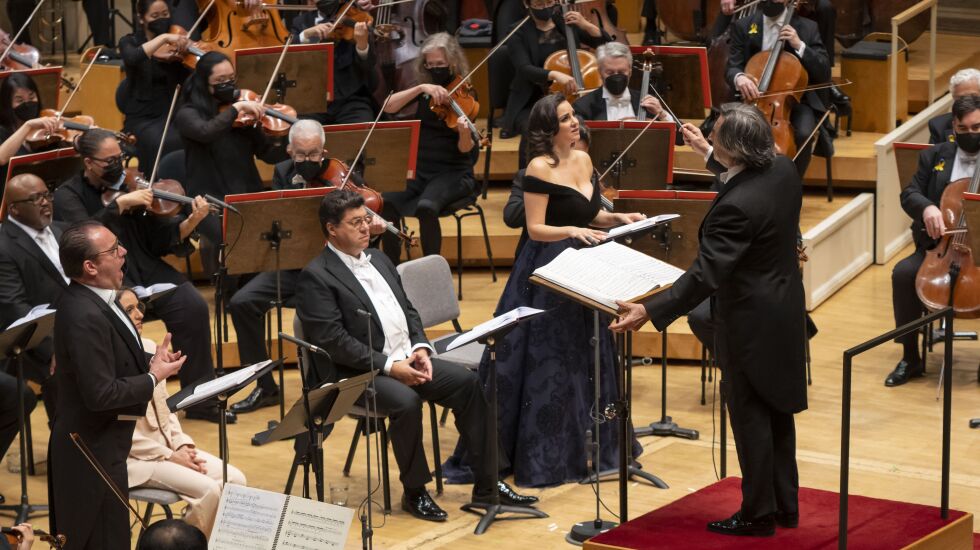
Among the top accomplishments for which Riccardo Muti will no doubt be remembered when he steps down as the Chicago Symphony Orchestra’s music director at the end of the 2022-23 season are the full-length concert performances of Giuseppe Verdi operas that he has overseen.
He has previously led four such presentations — “Otello” (2011), “Macbeth” (2013), “Falstaff” (2016) and “Aida” (2019) — and Thursday evening, he added a fifth, “Un ballo in maschera” as the finale of the orchestra’s 2021-22 subscription series.
The ever-popular 1859 opera, set in 18th-century colonial America because censors of the time forced multiple changes in locale, centers on an ill-fated love affair between the governor of Boston and the wife of his best friend — a story spiced with betrayal, vengeance and hidden identities.
Much like the conductor’s operatic offerings that came before, this performance was a thrilling, utterly memorable evening of music-making on every level.
These concerts across his tenure have given Muti a chance to share his estimable experience in the operatic form, including a 19-year tenure as music director of Milan’s La Scala, and especially his knowledge and insights as one of the world’s leading interpreters of Verdi. They have provided the CSO musicians a chance to stretch their repertoire and gain insights from interacting with the human voice and sustaining musical drama that they can apply to other aspects of their playing.
These concert takes might lack the theatricality or pageantry of a staged performance, but by putting the soloists and orchestra front and center onstage, they allow audiences to zero in on the music and singing in a way that is often not possible in an opera house.
And, oh, what singers and musicians. In this context, the CSO was instantly transformed into one of the world’s top opera orchestras, and Muti’s reputation allowed him to assemble nothing short of a dream cast.
Italian tenor Francesco Meli is one of the most sought-after interpreters in the role of Riccardo, governor of Boston, and it was not hard to see why. He was at the top of his game right from his opening notes, offering a poised, complete performance matching vocal power, brightness and depth with spot-on intonation and an instinctive feel for Verdi’s writing.
Soprano Joyce El-Khoury, as his lover, Amelia, was every bit his equal, drawing forth an impressive range of vocal timbres, especially in the dark, doleful opening Act 2 aria, which, in her hands, was a riveting emotional journey in itself.
The revelation of the evening was mezzo-soprano Yulia Matochkina who was was nothing short of electrifying as Ulrica, the fortune-teller who foretells Riccardo’s demise. With earthy low notes and vocal punch, she deliciously conjured all the menace and malevolence of this mysterious character.
Strong as well were baritone Luca Salsi as Renato, another top-notch singer who ably portrayed Riccardo’s best friend and Amelia’s husband, and soprano Damiana Mizzi. The soprano could have used just a bit more vocal oomph but she dashed off the coloratura demands of the trouser role of the page, Oscar, with spirited aplomb and made the most of this small but essential role.
Also deserving praise was the Chicago Symphony Chorus, prepared by Donald Palumbo. From guttural utterances to thunderous bursts, it showed considerable dynamic and expressive range as it pushed along and supported the story.
But the ultimate star of the show was Muti himself who meticulously shaped every facet of this opera, brilliantly handling the colliding and overlapping moods in the stunning ensemble sections and drawing the best from everyone gathered in front of him.
There were so many orchestral high points, like the wonderfully spooky opening of the second scene of Act 1 with rumbling strings, low clarinets and timpani blows. But Muti was arguably at his best during the extended duet in Act 2 between Riccardo and Amelia, carefully guiding the singers and the orchestral responses, injecting energy, urgency and feeling into every phrase.







